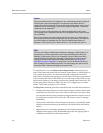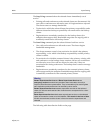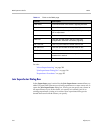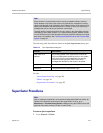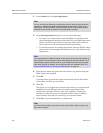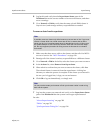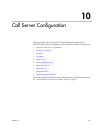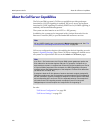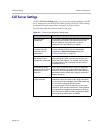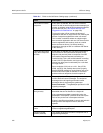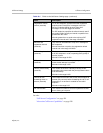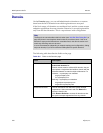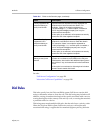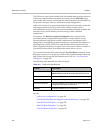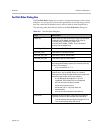
DMA Operations Guide About the Call Server Capabilities
220 Polycom, Inc.
About the Call Server Capabilities
The Polycom DMA system’s Call Server capabilities provide gatekeeper
functionality (if H.323 signaling is enabled), SIP proxy server and registrar
functionality (if SIP signaling is enabled), XMPP server (if XMPP signaling is
enabled), and bandwidth management.
The system can also function as an H.323 <-> SIP gateway.
In addition, the system can be integrated with a Juniper Networks Service
Resource Controller (SRC) to provide bandwidth assurance services.
Call server configuration begins with enabling the desired signaling on each
cluster’s Signaling Settings page. Other Call Server settings are shared across
all systems in a supercluster and set on the Admin > Call Server pages.
See also:
“Call Server Configuration” on page 219
“Call Server Settings” on page 221
Note
SIP and XMPP signaling are not supported in Maximum security mode. See “The
Consequences of Enabling Maximum Security Mode” on page 52.
Note
In an IPv4 + IPv6 environment, the Polycom DMA system gatekeeper prefers the
IPv4 address for devices that register with both. For example, if endpoint A is a
dual-stack device (that is, it supports both IPv4 and IPv6) and registers over IPv6 to
a Polycom DMA system that’s also dual-stack, the RRQ (Registration Request)
message informs the DMA gatekeeper of the endpoint's IPv6 and IPv4 addresses
(as well as its E.164 alias, etc.).
If endpoint A dials the E.164 address of another dual-stack endpoint (endpoint B),
DMA gives preference to the IPv4 address by sending endpoint B's IPv4 address in
the ACF (Admission Confirm) message to endpoint A. Even though the initial ARQ
and corresponding ACF were over IPv6, the expected behavior is that endpoint A
will continue the H.323 signaling session to endpoint B over IPv4 since the
DMAgatekeeper informed endpoint A of endpoint B's IPv4 signaling IP.



